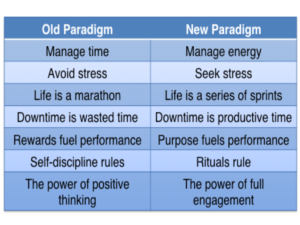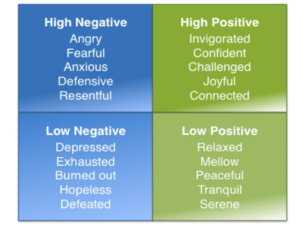19 Jul To be a top performer, manage your energy not your time
The common stereotype of senior executives working 60 hour weeks, not taking holidays, and enduring unhealthy levels of stress is well founded. Those fuelling this stereotype do indeed invest huge and unrelenting hours in being top performers. If you recognise yourself in this caricature, the personal price you are paying is very high.
Executive life is widely and rightly regarded as tough. Witness the shortening tenures of CEOs in major corporations, the prevalence of stress and burnout, and the constant refrain “I never have enough time”. Ironically, you would be an even better performer if you invested your energy, not your time.
In researching how to help a seriously stressed corporate executive, I recently dipped back into ‘The Power of Full Engagement’ by Tony Schwartz and Jim Loehr. Their research reveals that the old paradigm of being a better time manager is less helpful than a new way of thinking, namely managing your energy.
 The table on the left helped me see that high performance, good health and happiness are more likely to be found by focusing on skilful investment of energy. The authors point out that we all have more control over our energy than we realise.
The table on the left helped me see that high performance, good health and happiness are more likely to be found by focusing on skilful investment of energy. The authors point out that we all have more control over our energy than we realise.
And, when I think about the demands executive life, there is much more opportunity to control how an executive spends her or his time. After-all, you are required to prepare for, attend and follow-up on the meetings organised by others, as well as your own. Your have appointments scheduled with people who ‘have to see you’. And even when you get into the office very early or stay back very late, the ubiquitous email keeps calling.
Time management advisers say ‘switch off the email and check it once every hour’. Sure, I agree that’s smart time management, but it’s not a fundamental approach. It’s a well-proven part of the old paradigm.
The new paradigm: Manage your energy, not your time
The beauty of this way of thinking is that you own and control your energy. As an executive, it’s not at the beck and call of others to nearly the same degree as your time.
This thought leads to new paradigm as the table above outlines. Several of the ideas in the right hand column are quite the opposite of we have been taught to believe, e.g. seeking, not avoiding stress; and focusing on purpose rather than reward. For a very readable, quick explanation of the whole table go to Shane Parrish’s Farnam Street blog (I recommend you subscribe to this fabulous online resource on life).
Schwartz and Loehr (third paragraph above) explain that “Energy, not time, is the fundamental currency of high performance”. They see this as the ‘power of full engagement’ and suggest “Every one of our thoughts, emotions, and behaviors has an energy consequence. The ultimate measure of our lives is not how much time we spend on the planet, but rather how much energy we invest in the time we have.” Their book sets out practical ways of using energy management. Next I summarise the principles that underlie the approach.
To make maximum use of managing energy, rather than time, you must draw on four separate, but related sources of energy: physical, emotional, mental, and spiritual
To perform at your best, you must consciously and skillfully manage every aspect of our human sources of energy, namely physical, emotional, mental, and spiritual. These sources work together; if one is absent or low, the others are impaired. As an executive, like everyone, you need to strive to be whole person. You can’t fire on only two or three cylinders.
You must balance energy consumption with energy renewal, because energy capacity diminishes with both over- and under-use
We rarely count our energy; there no energy watch on your wrist or energy alarm clock like there is with time. Energy is finite and you should not assume that your energy is limitless. You need to find ways to recharge your battery. Think of your executive life as a series of sprints between which you recover, not as a marathon.
You must push beyond your normal limits to build energy capacity; you must train in the same way as top athletes do
Stress is a gift if sensibly managed. It is a key to growth. Think of pushing your muscles hard while exercising to train them; you must push yourself on all four energy fronts to build your full capacity.
You need rituals for managing energy to be capable of sustained, all-round high performance
 Humans are creatures of habit. As a result most change initiatives are less than fully successful
Humans are creatures of habit. As a result most change initiatives are less than fully successful
because you have to re-learn and do things differently. To be successful in this you need new routines that become the your new habit. Make these rituals. Plan the day at the start or the z
night before. Get home after work prepared for the most important conversation of the day–with your partner. Never allow a meeting to start with a clear agenda and an agreed hard stop time.
Energy is the common denominator in all dimensions of our lives
The table depicts the dynamics of energy: Your physical energy capacity from high at the top to low at the bottom. And your emotional capacity from negative on the left hand side to positive on the right.
Into which quadrant do you fall most of the time? If it is the top right, you need to understand why you are successful in nurturing and investing your energy for high all-round performance.
If you are in one of the other three quadrants for most of your life, then start today to learn to manage your energy, not your time. And become a more fulfilled, more productive, happier person.
Further sources
If you want to delve into other aspects of this topic read:
+ Do you have a personal feedback system? one of my posts, and
+ Focus, Daniel Goleman’s latest book is a useful resource as he discusses this little-noticed and under-rated mental asset that matters enormously to how we navigate life.


